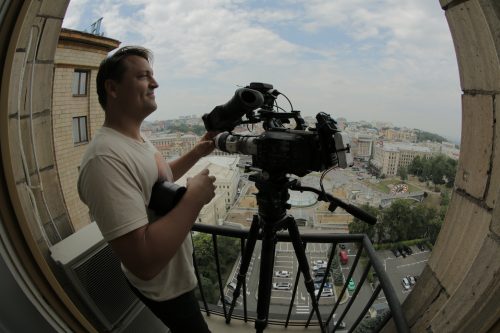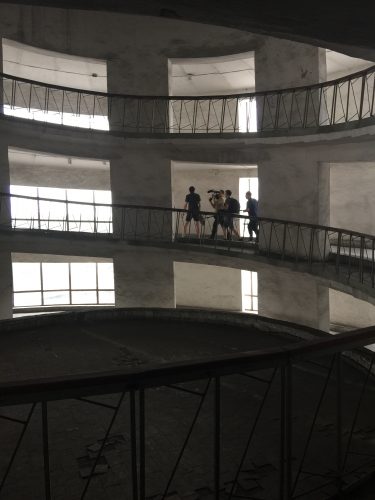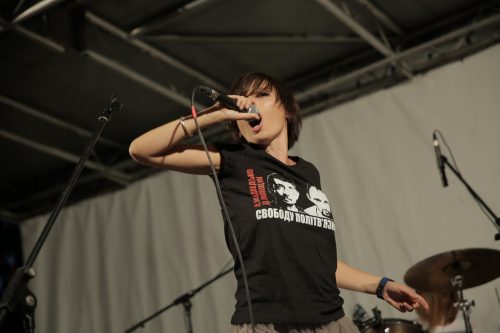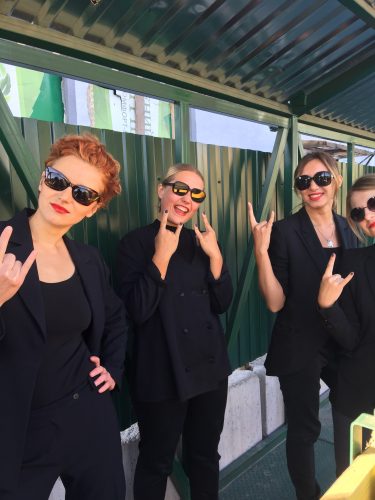
ITP Crew
Like so many artist-creators who felt somewhat suffocated under our country’s last political regime, for me it was like a breath of fresh air when our new government was formed. Cuts to the CBC and the arts gave us all the impression that fiction and documentaries were no longer relevant… no longer part of who we are. Yet I can’t find a better example of a more relevant documentary series in this day and age than Interrupt This Program, created by Nabil Mehchi and Frank Fiorito for the CBC.
Interrupt This Program is a five-part, 30-minute series that delves into the underground arts scene in chaotic cities recovering from major traumas: long-term war, political unrest, natural disasters or economic meltdown. Each episode profiles three or four young, determined local artists (plus one Canadian ex-pat with an outsider’s perspective) who are using art to make an impact on their city: this is art as a form of protest, as an agent of change and as a display of courage.
I had the pleasure of interviewing Nabil to give us further insight into this remarkable series.
How did you come up with the concept of the series? Why the title, “Interrupt This Program”?
The city of Beirut was the initial inspiration for the series. It’s where I was born and raised. I moved to Canada when I was 17, during the 1989 war (at the height of the civil war). So I never really got a chance to discover the city as an adult. When I started going back with Frank (Fiorito, my partner & series co-creator and producer), we started to uncover an effervescent underground art scene, and a sort of militant way of making art. Most of the artists we met seemed to be fighting, each in their own way, to reclaim all that Lebanon had lost (an Arabic identity, the heyday of the flourishing art scene of the 60s and 70s). We felt compelled to tell the story of a city that, in the minds of people around the world, only exists as the stage of all the horrors of the Middle East… when there is so much more to it. Young Lebanese artists are working hard at getting their voices heard amidst the chaos that is Beirut, and we felt compelled to tell that story, help them tell their own stories, in their own voices (no filter, no host, no narration). Of course, once we started thinking of all the other cities we were curious about, the list grew and a doc series idea became obvious.
It was actually the CBC that came up with the title of Interrupt This Program.
We went back and forth on possible titles and when they proposed Interrupt This Program, we all felt that it spoke to what all the artists in all those cities were doing in a way. They’re imposing a new narrative. They’re breaking with the conventions and status quo of their cities’ deadlock. They’re interrupting the program.

ITP Crew Photo
What do you think is the most resonating hook of the series? When I watched the first episode on Beirut, the resilience of the city and its artists resonated most with me…
The hook of the series I think is its universal themes. The always-fascinating yet obvious fact that wherever we come from, we all have the same aspirations and dreams; and that’s even more true when it comes to artists. In every city we’ve been to, the same statements kept emerging: we want to change the conversation, we want to impose a new dialogue, we aim to raise awareness of some of the most burning and essential questions in our societies: basic questions of human rights.
The other hook of the series I think is its exoticism. We’re taking audiences to places they rarely have a chance to visit or discover, let alone (dig into) their underground art scenes. It’s like they’re travelling vicariously through our characters.
What made you choose these 5 cities for Season 1? Can you describe the selection process of the cities and the artists?
The main criterion for the series was trauma. Each city had to have gone through a major traumatic episode or period that shook it to its core, whether it was a war, social/political upheaval, the overthrow of a corrupt government, an economic crash or even a natural disaster.
We did not want to do war porn. Each city had gone through something major in its recent political history, but is still labouring to get out of it.
Also, we chose cities that have been the subjects of recent turmoil. We wanted the first season to be very topical. Kiev, Beirut, Port-au-Prince, even Athens are all places where history is being made as we speak and (was unfolding) while we were there filming.
And we went searching for artists who are using art as a tool for protest, for social awareness and change. We wanted subversive, bold, unapologetic, militant art. Fearless artists who were putting themselves and their art on the line in order to impose a new vision. But then again, as one of the artists in the Athens episode put it: “All art is political; art without meaning is mere decoration!”

ITP Kiev – Irena Karpa
What were some of the most difficult challenges you faced in producing the series?
I would say the most difficult aspect of the production was limiting ourselves to 3 or 4 artists per city. Once we started the research, we opened up the floodgates to endless stories and fascinating artists who were all strong and pertinent. A choice had to be made based on varying the disciplines and (on) the availabilities of these artists during our short 5-day shooting period per city.
Other than that, it was incredible to see how fast we were able to connect with all those emerging artists, and how generous and willing they were to let us into their worlds.
I find this series original in that it allows me to discover a city I do not know well, through the eyes of various artists – a POV that is diverse and dynamic. What did you discover most about the artists and/or the cities?
We were all humbled (every single person on the crew) by the courage and determination of all the artists that we had the chance to meet. But what we walked away with was the power that art has to change minds and perceptions. As Maria Kulikovska said in the Kiev episode: “Art comes from in here, from the heart, not only from the brain. And it’s very emotional, it’s something that you can’t even explain. I do these actions/provocations to start a discussion; I hope that something will start to change inside people.”

ITP Kiev – Maria and gang
Do you have further cities you wish to explore, in more seasons?
We have a list of about 25 more cities that we had initially researched and that we would love to discover and uncover. We have started preparing for another 10 episodes/cities to pitch to CBC for a 2nd season: Teheran, Ramallah and Lagos are 3 of them. That’s all I can say. You’ll have to wait and see (fingers crossed)
What is the one question you wish you were asked about the series?
The one question I always love to answer because it’s something we genuinely thought of while developing the series is, “What do you want audiences to feel or walk away with after watching this series?”
And my answer is that we, as TV producers and filmmakers, would love to change people’s perceptions (or confirm them in certain instances). I want people to walk away feeling that they’re not that different from a person in Lebanon or Ukraine or Haiti. We live in an increasingly global society where the borders are slowly disappearing and our planet is in constant flux. People and cultures are mixing at such a fast rate and clashing at an even faster one. I would love this series to change people’s perception of the Other, the “Us versus Them.”
Especially here in Canada, where we have so many different ethnic communities. Immigrants, refugees, migrants, whatever we want to call them, they all have stories and traditions and cultures that we as a host country need to be more aware of. Just as they have to learn about our ways and our values, the same responsibility falls on us.
For more info about the series:
http://www.cbc.ca/beta/arts/interruptthisprogram








